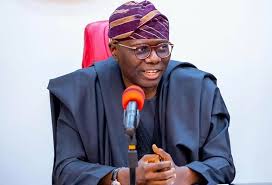Susan Grant is the Country Director of Save the Children, the world’s leading organisation for children’s development. In this interview with ETTA MICHAEL BISONG, the children’s rights campaigner comments on the vision of her organisation for Nigeria and also expresses reservation over the activities of Connected Development (CODE) in Zamfara state, particularly the #Save Bagega campaign that saved the lives of over 1, 500 children during the outbreak of lead contamination in the small rural community in 2010
What is your perception of CODE and their various initiatives on children and environmental protection?
I think that it is commendable that a group of young Nigerians are really taking ownership of doing something to protect the environment and to also save children’s lives. It is good to know that we have an organisation that is interested in this area. When the group realised that children were dying because of ‘’lead poisoning’’ then in Zamfara they went out to mobilise the communities, they worked with a lot of organisations and got people to take action. This has been a journey that they have been on and putting that effort they managed to save the lives of over one thousand five hundred (1, 500) children. So, I think that is really commendable.
Another important thing is that artisanal and small scale mining sector has not generated a lot of interest from non-governmental organisations (NGOs), international organisations and other development partners. Thank God we are beginning to see pocket of organisations showing interest, it shows that there is hope for the future of the mining sector. I am happy that Follow the Money (An initiative of CODE) is looking at the issue of lead poisoning in Zamfara state. It is critical because N850 million I understand was release for remediation and most importantly good mining practices. Again the mistake we make in this part of the world is to adopt narrow approaches to the issue.
We focus on treatment and leave one out, but I am glad that in this case the three components have been looked into and it will be good to know how much the government has release. Beyond what has been released by the government Nigerians need to know how these money is utilised
and how it impact their lives. It’s critical because we have to take this beyond the issue of output we have to look at outcome that is what Nigerians need to see and know. And I am optimistic that since CODE have started you also look in area like this.
What is the partnership plan between Save the Children and CODE to encourage this kind of work?
We are like another stakeholder. We are doing some other work, but I do hope that we can work closely and support them. This event to highlight what they have been doing in Zamfara, bringing the communities together and getting them to take action I think it’s really commendable and I hope that more people will come out and support them.
What is your intervention plan for Bagega?
We are aware also of the fact that actions was been taken. So, we are working in Zamfara on child nutrition and also child education programme. We knew what was happening and so we linked in with the other bodies that were taking action at that time. But again it’s not only in Bagega we have these issue. There are communities in Nasarawa and Niger states where children are been born deformed and people do not have the basic needs of live.
What other approach apart from remediation do you think can be deploy to address the issue of artisanal and small scale mining in Nigeria?
Artisanal and small scale mining have come to stay in Nigeria. It’s a global phenomenon and is driven by so many factors one of them is poverty. Now with our growing poverty rate you cannot stop ASM. The Zamfara state government attempted at a time to outlaw it but they didn’t succeed because as long as these men out there across Nigeria scavenging the earth are hungry there are going to look for food. Again the price of the commodity at the international market is also a driver apart from poverty. The cost of gold has been raising over the years and so for this average miner in Zamfara state he’s not going to accept to go back to the farm. The best approach is to see how to formalise the artisan miners and not criminalise them and find a way of developing the artisanal and small mining value chain. That way you are able to bring them in and strengthened them by building capacity and that way money goes back to the federal government.
What do you think is the major challenge to Nigeria children?
I think it’s really important that everyone take responsibility of ensuring that children have the childhood, that Nigeria children can also grow up in a country and have a live without violence and exploitation. And I think it’s important that Nigerians look at how to make Nigeria one of the best countries in the world to live and ensuring that children have the right to basic services such as health, education and shelter so that they are able to grow, develop and reach the full potential and to do that without the risk of exploitation and that will be a legacy.
What are the other states apart from Zamfara is your organisation currently working?
Currently, we are working with partners in over 10 states in Nigeria in the area of health nutrition, child survival, education and child protection. So, we explore advocacy in some of our community engagement work not where we are reaching quite the whole of Nigeria but that is our aim that we really hope that we can support other community organisations to be the voices of children and how we can get messages to the length and breadth of Nigeria and to support and work with Nigerians to get their children to live the life that they deserve.
What would be your advise to CODE and similar organisations developing initiatives to protect children’s rights and environment in Nigeria?
I think it’s really important that a lot of organisations are coming, particularly they are young people. These are young Nigerians and I think what is very important is to have the ambition, integrity, transparency and be hardworking. If they have the passion as well to change and take people with them and do things for the better in an open and transparent way and maintain their integrity then they will succeed because people will want to become part of them and to support them.



